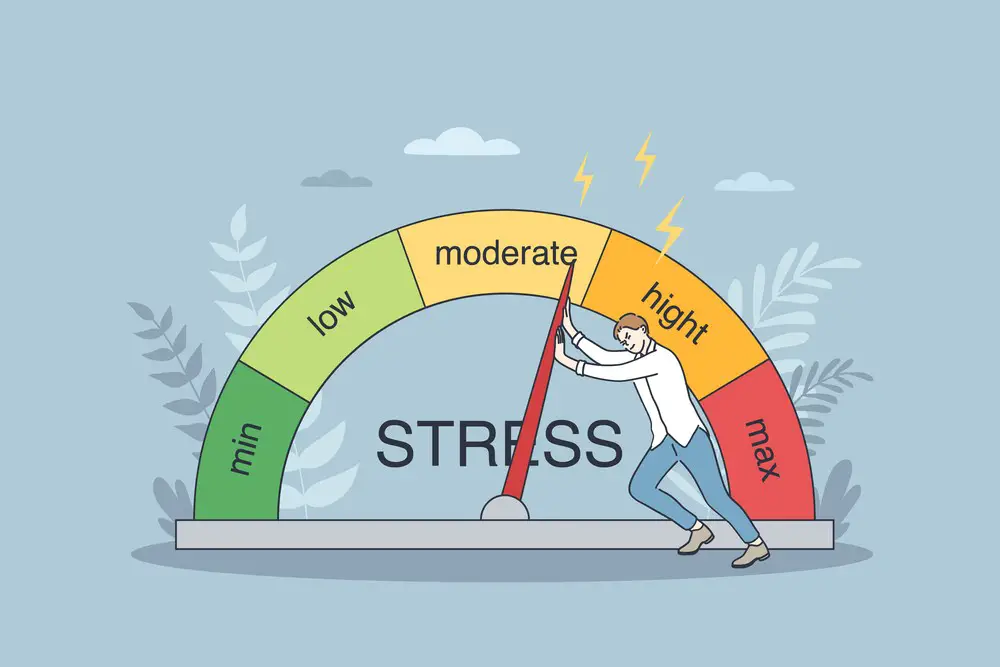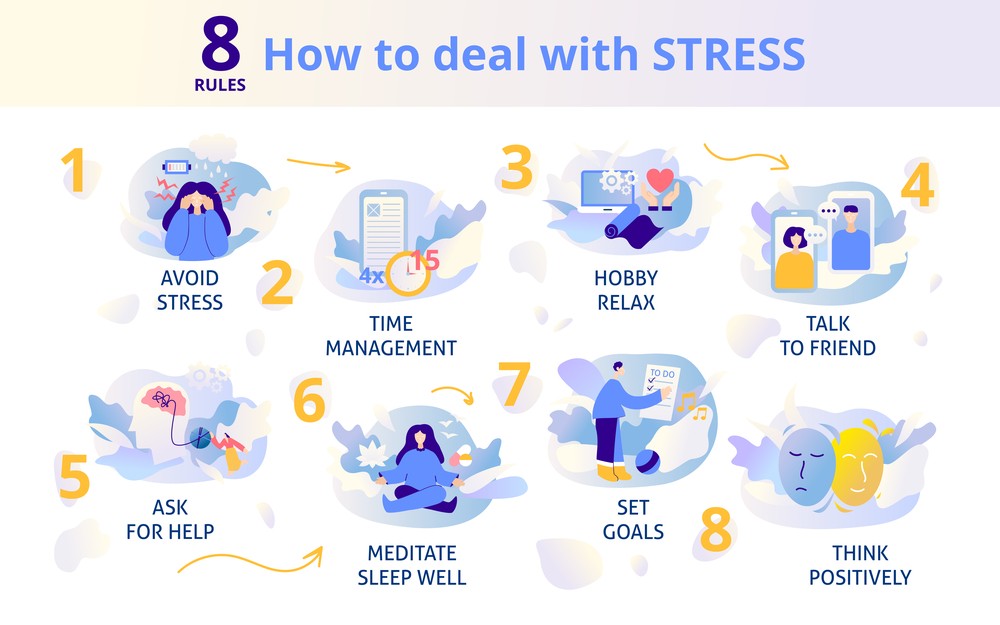As a BetterHelp affiliate, we receive compensation from BetterHelp if you purchase products or services through the links provided
Stress is common in modern life, and many experience symptoms like headaches, muscle tension, and fatigue. However, some people may also experience vaginal bleeding due to stress. While this can be worrying, it is important to understand that stress-induced vaginal bleeding is usually not a cause for concern and can be managed with proper care.
Stress affects the body, causing hormonal imbalances and inflammation, resulting in changes in the menstrual cycle and exacerbating gynecological conditions. If you are experiencing vaginal bleeding due to stress, consult your healthcare provider immediately to rule out any underlying medical conditions.
Key Takeaways
- Stress can disrupt hormone levels and cause inflammation, leading to changes in the menstrual cycle and vaginal bleeding.
- Stress can exacerbate existing gynecological conditions that may cause vaginal bleeding.
- If you are experiencing vaginal bleeding related to stress, it is important to speak with your healthcare provider to rule out any underlying medical conditions.

Understanding Stress and Vaginal Bleeding
If you’ve been experiencing vaginal bleeding outside your normal menstrual cycle, you may wonder if stress is to blame. While stress can impact your body in various ways, it’s important to understand the connection between stress and vaginal bleeding.
Stress is a natural response to challenging situations, and it can manifest in a variety of physical and emotional symptoms. When you experience stress, your body releases hormones like cortisol and adrenaline, which can impact your menstrual cycle and cause irregular bleeding.
In addition to stress, other factors like hormonal imbalances and anxiety can also contribute to vaginal bleeding. Hormonal imbalances, for example, can cause irregular periods and spotting, while anxiety can lead to tension in the pelvic muscles and vaginal dryness.
Talking to your healthcare provider is important if you’re experiencing vaginal bleeding outside your normal menstrual cycle. They can help you identify the underlying cause of your symptoms and develop a treatment plan tailored to your needs.
Key Takeaway: Stress can impact your menstrual cycle and cause irregular bleeding, but it’s important to consider other factors like hormonal imbalances and anxiety. If you’re experiencing vaginal bleeding outside your normal menstrual cycle, talk to your healthcare provider to identify the underlying cause and develop a treatment plan.
 Symptoms of Stress-Induced Vaginal Bleeding
Symptoms of Stress-Induced Vaginal Bleeding
Stress can cause various unusual and upsetting symptoms, including vaginal bleeding. Here are some of the symptoms to look out for:
- Spotting: Spotting is light bleeding outside your regular menstrual cycle. It can be caused by stress and anxiety, among other things.
- Pain: Stress-induced vaginal bleeding can cause pain in the pelvic area. This pain can range from mild to severe and can be accompanied by cramping.
- Irregular periods: Stress can cause your menstrual cycle to become irregular. You may experience shorter or longer periods than usual or skip periods altogether.
- Discharge: Stress-induced vaginal bleeding can also cause changes in your vaginal discharge. You may notice that your discharge is thicker or more watery than usual.
- Itching: Stress can also cause vaginal itching, which can be uncomfortable and irritating.
If you are experiencing any of these symptoms, seeing a healthcare provider to rule out any underlying medical conditions is important. Your healthcare provider can also help you manage your stress levels and provide treatment for any symptoms you may be experiencing.
Key takeaway: Stress-induced vaginal bleeding can cause various symptoms, including spotting, pain, irregular periods, discharge, and itching. If you are experiencing any of these symptoms, it is important to see a healthcare provider to rule out any underlying medical conditions and get the help you need.
Role of Hormones in Stress and Vaginal Bleeding
When it comes to vaginal bleeding, hormones play a significant role. Stress can affect your hormone levels, leading to changes in your menstrual period. Here’s how it works:
- Hormones: The menstrual period is regulated by estrogen and progesterone. These hormones help prepare the uterus for pregnancy and regulate the menstrual cycle.
- Menstrual Period: The menstrual period is the shedding of the uterine lining. This occurs when the body doesn’t become pregnant. It’s a sign that the reproductive system is working properly.
- Ovulation: Ovulation is the release of an egg from the ovary. This occurs once a month, and it’s when a woman is most fertile.
- Hormone Levels: Hormone levels fluctuate throughout the menstrual cycle. During ovulation, estrogen levels and progesterone levels are high during the second half of the menstrual cycle.
Stress can disrupt the delicate balance of hormones in the body. When stressed, your body produces cortisol, which can interfere with producing reproductive hormones. This can lead to changes in your menstrual cycle, including vaginal bleeding.
Key takeaway: Hormones play a crucial role in regulating the menstrual cycle. Stress can affect hormone levels, leading to changes in the menstrual cycle, including vaginal bleeding.
Possible Causes of Vaginal Bleeding
Experiencing vaginal bleeding can be a concerning and scary experience. There are several possible causes of vaginal bleeding, including hormonal imbalances, pregnancy complications, and chronic health conditions. Here are some of the potential causes of vaginal bleeding:
- Infections: Infections in the vagina or cervix can cause bleeding, such as yeast infections, bacterial vaginosis, or sexually transmitted infections (STIs).
- Hormonal imbalances: Hormonal imbalances can cause irregular bleeding, including thyroid disorders, polycystic ovary syndrome (PCOS), or menopause.
- Polyps or fibroids: Polyps and fibroids are noncancerous growths that can develop in the uterus and cause bleeding.
- Cancer: Cervical, uterine, and vaginal cancers can cause vaginal bleeding, especially in postmenopausal women.
- Trauma or injury: Trauma or injury to the vagina or cervix can cause bleeding, such as during sexual activity or a pelvic exam.
- Medications: Certain medications, such as blood thinners or hormonal contraceptives, can cause vaginal bleeding as a side effect.
It’s important to note that vaginal bleeding can be a symptom of a serious condition, so it’s essential to seek medical attention if you experience any unexplained bleeding.
Key takeaway: Vaginal bleeding can have several possible causes, including infections, hormonal imbalances, polyps or fibroids, cancer, trauma or injury, and medications. It’s crucial to seek medical attention if you experience any unexplained bleeding.
 Diagnosing Stress-Induced Vaginal Bleeding
Diagnosing Stress-Induced Vaginal Bleeding
Suppose you are experiencing vaginal bleeding that you suspect may be caused by stress. In that case, it is important to see a healthcare provider to rule out any other underlying conditions causing the bleeding. Here are some of the methods that your healthcare provider may use to diagnose stress-induced vaginal bleeding:
- Pelvic Exam: During a pelvic exam, your healthcare provider will examine your reproductive organs for signs of infection, injury, or abnormal growth.
- Ultrasound: An ultrasound uses sound waves to create images of your reproductive organs. This can help your healthcare provider identify any abnormalities causing your vaginal bleeding.
- Biopsy: If your healthcare provider suspects that you may have an abnormal growth in your reproductive organs, they may perform a biopsy. A small tissue sample is removed and examined under a microscope during a biopsy.
- Pap Test: A Pap test is a screening test that detects abnormal cells in your cervix that may be a sign of cervical cancer. Your healthcare provider may recommend a Pap test if they suspect your vaginal bleeding is caused by an abnormality in your cervix.
- Hysteroscopy: A hysteroscopy is a procedure that allows your healthcare provider to examine the inside of your uterus using a thin, flexible tube with a camera attached. This can help your healthcare provider identify any abnormalities causing your vaginal bleeding.
It is important to remember that stress-induced vaginal bleeding is a diagnosis of exclusion, meaning that other underlying conditions must be ruled out before stress can be determined as the cause. Your healthcare provider will work with you to determine the appropriate diagnostic tests based on your symptoms and medical history.
Key takeaway: To diagnose stress-induced vaginal bleeding, your healthcare provider may perform a pelvic exam, ultrasound, biopsy, Pap test, or hysteroscopy. Stress-induced vaginal bleeding is a diagnosis of exclusion, meaning other underlying conditions must be ruled out before stress can be determined as the cause.
Complications and Risks
Stress can cause vaginal bleeding, and it is essential to understand its potential complications and risks. Here are some of the possible risks and complications that you should be aware of:
Pregnancy Complications
If you are pregnant, stress-related vaginal bleeding can signify a miscarriage or an ectopic pregnancy. Miscarriage is the loss of a pregnancy before the 20th week, and ectopic pregnancy is when the fertilized egg implants outside the uterus. Both of these conditions are medical emergencies and require immediate medical attention.
Placenta Previa
Placenta previa is a condition where the placenta covers the cervix partially or completely. Stress-related vaginal bleeding can be a sign of placenta previa, and it can cause significant complications during pregnancy and delivery. Women with placenta previa are at higher risk of preterm labor, hemorrhage, and other complications.
Postmenopausal Bleeding
Postmenopausal bleeding is vaginal bleeding that occurs after menopause. Stress-related vaginal bleeding can be a sign of postmenopausal bleeding and a symptom of a serious underlying condition, such as endometrial cancer. It is essential to see your healthcare provider if you experience postmenopausal bleeding.
Bleeding Disorders
Stress-related vaginal bleeding can indicate a bleeding disorder, such as von Willebrand disease or hemophilia. These conditions can cause excessive bleeding and bruising, requiring medical attention to manage.
Anovulation
Stress can cause hormonal imbalances that can disrupt ovulation, leading to irregular menstrual cycles and vaginal bleeding. Anovulation is the absence of ovulation, which can cause infertility and other complications.
Placental Abruption
Placental abruption is when the placenta separates from the uterine wall before delivery. Stress-related vaginal bleeding can be a sign of placental abruption, and it can cause significant complications for both the mother and the baby.
Key Takeaway: Stress-related vaginal bleeding can signify various complications and risks, including pregnancy complications, bleeding disorders, anovulation, and placental abruption. It is essential to seek medical attention if you experience vaginal bleeding, especially if you are pregnant or postmenopausal.
 Treatment and Management
Treatment and Management
If you experience vaginal bleeding due to stress, seeking medical attention to rule out any underlying medical conditions is essential. Your doctor will recommend a treatment plan based on the cause of your vaginal bleeding. Here are some common treatments and management strategies for vaginal bleeding caused by stress:
- Birth control: Hormonal birth control, such as pills, patches, or an intrauterine device (IUD), can help regulate your menstrual cycle and reduce bleeding. Your doctor may recommend a specific type of birth control based on your medical history and individual needs.
- Hormone replacement therapy: If you’re going through menopause, your doctor may recommend hormone replacement therapy (HRT) to help regulate your hormones and reduce vaginal bleeding.
- Antibiotics: If your vaginal bleeding is caused by an infection, such as pelvic inflammatory disease (PID), your doctor may prescribe antibiotics to treat and reduce bleeding.
- Ibuprofen: Over-the-counter pain relievers, such as ibuprofen, can help reduce pain and inflammation associated with vaginal bleeding caused by stress.
- Hysterectomy: In severe cases, your doctor may recommend a hysterectomy to remove your uterus and stop vaginal bleeding.
In addition to medical treatments, there are some lifestyle changes you can make to help manage stress and reduce vaginal bleeding, including:
- Exercise: Regular exercise can help reduce stress and improve overall health.
- Healthy diet: Eating a healthy, balanced diet can help reduce stress and promote overall health.
- Relaxation techniques: Relaxation techniques, such as deep breathing, meditation, or yoga, can help reduce stress and promote relaxation.
- Sleep: Getting enough sleep is essential for reducing stress and promoting overall health.
- Avoiding triggers: Identify and avoid triggers that cause stress in your life.
Key takeaway: Treatment for vaginal bleeding caused by stress may include hormonal birth control, hormone replacement therapy, antibiotics, pain relievers, or a hysterectomy. Lifestyle changes like regular exercise, a healthy diet, relaxation techniques, and adequate sleep can also help manage stress and reduce vaginal bleeding.
 Prevention and Health Tips
Prevention and Health Tips
When it comes to preventing vaginal bleeding caused by stress, you can do a few things to help reduce your risk. Here are some tips:
- Manage your stress levels: This is the most important step you can take. Find ways to reduce stress, such as practicing yoga or meditation, taking walks, or spending time with loved ones.
- Get plenty of rest: Make sure you sleep enough each night. This will help your body cope with stress and reduce your risk of abnormal vaginal bleeding.
- Eat a healthy diet: A healthy diet can help reduce stress and keep your body in good shape. Ensure you eat plenty of fruits, vegetables, whole grains, and lean proteins.
- Exercise regularly: Regular exercise can help reduce stress and keep your body healthy. Aim for at least 30 minutes of moderate exercise most days of the week.
- Avoid smoking: Smoking can increase your risk of health problems, including abnormal vaginal bleeding.
- Practice good hygiene: Make sure you’re practicing good hygiene, such as washing your hands regularly and keeping your genital area clean and dry.
If you’re experiencing abnormal vaginal bleeding, there are a few things you can do to help manage the symptoms:
- Use pads instead of tampons: Pads are less likely to irritate the vaginal area and can help reduce the risk of infection.
- Avoid douching: Douching can disrupt the natural balance of bacteria in the vagina and increase the risk of infection.
- Use lubrication: If you’re experiencing vaginal dryness, using a water-based lubricant can help reduce discomfort during sex.
- Talk to your doctor: If you’re experiencing abnormal vaginal bleeding, it’s important to talk to your doctor. They can help determine the cause of your symptoms and recommend appropriate treatment.
Key Takeaway: To prevent vaginal bleeding caused by stress, manage your stress levels, get plenty of rest, eat a healthy diet, exercise regularly, avoid smoking, and practice good hygiene. If you’re experiencing abnormal vaginal bleeding, talk to your doctor and consider using pads instead of tampons, avoiding douching, using lubrication, and practicing good hygiene.
Current Research and Advancements
When it comes to the relationship between stress and vaginal bleeding, there is ongoing research to understand the connection better. While stress is known to impact the body and can lead to various health issues, including hormonal imbalances, it is not yet fully understood how it may contribute to vaginal bleeding.
Recent research has suggested that stress may play a role in precipitating bleeding episodes in patients with certain bleeding diatheses, such as von Willebrand factor deficiency. A study published in the National Library of Medicine found that stress can induce procoagulant states, leading to bleeding episodes in these patients.
In addition, a prospective cohort study using postal surveys found that there may be a temporal relationship between the development of self-reported symptoms of vaginal bleeding and the development of psychological distress among women in the community. While this study did not specifically address the role of stress in causing vaginal bleeding, it does suggest that there may be a connection between psychological distress and vaginal bleeding.
While current research has not definitively linked stress to vaginal bleeding, several strategies may help manage stress and potentially reduce the risk of experiencing vaginal bleeding. These strategies include:
- Exercise: Regular physical activity has been shown to reduce stress levels and improve overall health.
- Mindfulness meditation: This practice focuses on the present moment and can help reduce stress and anxiety.
- Therapy: Talking to a mental health professional can provide a safe space to discuss and manage stress.
- Self-care: Engaging in joyful and relaxed activities can help reduce stress levels.
Key takeaway: While the link between stress and vaginal bleeding is not yet fully understood, several strategies may help manage stress and potentially reduce the risk of experiencing vaginal bleeding. These include exercise, mindfulness meditation, therapy, and self-care.
 Crossing the Line: When Stress Symptoms Warrant Professional Help
Crossing the Line: When Stress Symptoms Warrant Professional Help
As you mentioned, stress is nearly ubiquitous in our fast-paced lives, manifesting in various physical symptoms like headaches and muscle tension. In some cases, it can even lead to more unusual symptoms like vaginal bleeding. While stress reliever toys or mindfulness techniques can offer temporary relief, there are situations where the symptoms are severe enough to necessitate professional intervention. But how do you recognize when you’ve reached that point?
Signs Stress Is Taking a Toll
- Chronic Physical Symptoms: When stress-induced symptoms like headaches or fatigue become recurrent or chronic, it might be time to consult a healthcare provider.
- Disrupted Menstrual Cycle: If stress is affecting your menstrual cycle, causing irregularities or even vaginal bleeding, immediate medical consultation is warranted.
- Gynecological Conditions: Stress can exacerbate existing conditions, making symptoms worse or even dangerous.
- Mental Exhaustion: Feeling overwhelmed or experiencing a constant state of mental fatigue can indicate that stress has exceeded manageable levels.
- Decreased Quality of Life: If stress is adversely affecting your social interactions, job performance, or overall happiness, professional help may be needed.
When to Consider Therapy
If you find that stress-induced symptoms like vaginal bleeding persist and other health issues have been ruled out, psychological intervention may be beneficial. Therapists can help you identify the root causes of your stress, provide coping mechanisms, and recommend a multi-disciplinary approach involving other healthcare providers for a holistic treatment plan.
JustAnswer: Immediate Psychological Support
If you’re dealing with stress symptoms and you’re not sure what your next steps should be, we’ve partnered with JustAnswer. You can chat live with a real psychologist to help you identify whether your symptoms are severe enough to require therapy or other interventions. They can advise you on what the next steps should be, tailored specifically to your situation.
The bottom line is, that while stress is a part and parcel of life, it shouldn’t be allowed to dictate it. The moment stress starts affecting your physical and emotional well-being in a debilitating way, it’s time to seek professional guidance. Don’t underestimate the importance of getting the help you need; your well-being is worth it.
 Mapping the Mind: Setting Goals for Therapy and Tracking Progress
Mapping the Mind: Setting Goals for Therapy and Tracking Progress
Embarking on a therapeutic journey can sometimes feel like setting sail into uncharted waters. You know you need to go somewhere—away from the stress, the anxiety, or whatever it is you’re dealing with—but exactly where you’re headed might not be clear. This is where setting goals and tracking your progress in therapy come into play.
Setting Tangible Goals
A therapy journey should begin with a roadmap of objectives tailored to your specific needs. Here are some typical goals people often set:
- Emotional Stability: Achieving a balanced emotional state, free from extreme highs and lows.
- Improved Relationships: Developing better communication skills and fostering deeper connections with loved ones.
- Coping Mechanisms: Learning new ways to deal with stress, anxiety, or other challenges in a healthy manner.
- Self-Acceptance: Working on self-esteem and coming to terms with who you are.
- Behavioral Changes: Breaking bad habits or replacing them with more beneficial ones.
Monitoring Progress: The Milestones
Keeping track of your progress can keep you motivated and make the therapeutic journey feel less overwhelming. Look out for these signs:
- Smaller Emotional Swings: As you work through issues, the peaks and valleys of your emotional landscape should become less extreme.
- Better Interactions: You might find social situations easier to navigate, and relationships may begin to improve.
- Skill Application: Notice if you’re applying coping skills from therapy to real-world situations effectively.
- Increased Self-Awareness: You should become more aware of your triggers and emotional reactions.
- Changing Patterns: Are the problematic behaviors or thought patterns becoming less frequent or less intense?
Frequently Asked Questions

Can stress cause abnormal vaginal bleeding?
Yes, stress can cause abnormal vaginal bleeding. When stressed, your body releases hormones that can affect your menstrual cycle. This can cause irregular periods, heavy bleeding, or spotting between periods. Stress can also cause other gynecological problems, leading to abnormal vaginal bleeding.
Is stress a common cause of spotting during pregnancy?
Spotting during pregnancy can have many causes, and stress is one of them. Stress can cause changes in hormone levels, which can lead to spotting during pregnancy. However, seeing your healthcare provider if you experience spotting during pregnancy is important to rule out any serious complications.
What are the symptoms of stress-related vaginal bleeding?
The symptoms of stress-related vaginal bleeding can vary depending on the cause. Some common symptoms include irregular periods, heavy bleeding, spotting between periods, and cramping. If you are experiencing any of these symptoms, seeing your healthcare provider to determine the cause is important.
How can stress affect menstrual cycles?
Stress can affect menstrual cycles in many ways. It can cause irregular periods, heavy bleeding, or spotting between periods. Stress can also cause other gynecological problems that can affect menstrual cycles. It is important to manage stress to keep your menstrual cycle regular.
What are some ways to manage stress-related vaginal bleeding?
There are many ways to manage stress-related vaginal bleeding. Here are some strategies you can try:
- Practice relaxation techniques, such as deep breathing, yoga, or meditation.
- Exercise regularly to reduce stress and improve your overall health.
- Get enough sleep to help your body cope with stress.
- Eat a healthy diet to support your body’s needs.
- Talk to a therapist or counselor to help manage stress and anxiety.
Can stress cause sudden gush of blood not on period?
Yes, stress can cause a sudden gush of blood not on your period. This can happen if stress causes changes in hormone levels, which can lead to irregular bleeding. If you experience a sudden gush of blood not on your period, it is important to see your healthcare provider to determine the cause.
Key takeaway: Stress can cause abnormal vaginal bleeding, including irregular periods, heavy bleeding, spotting between periods, and cramping. It is important to manage stress through relaxation techniques, exercise, sleep, a healthy diet, and therapy to keep your menstrual cycle regular. If you experience abnormal vaginal bleeding, seeing your healthcare provider to determine the cause is important.
About Jacob Maslow
After surviving the traumatizing events of 9/11, I took it upon myself to heal through helping others. I’m the primary caregiver of my children and understand from first-hand experience the lonely paths you have to walk as a partner and parent when leaving an unhealthy relationship.
We’re all echoing in a dark space that doesn’t have to be this empty, and that’s been my mission since finding solace and recovery in therapy: To help comfort others who are still in shock and at the prime of their struggle.
I came across BetterHelp after searching for this type of community. I wanted to belong to a body of proactive therapists and supportive therapy veterans that allowed me to see other sides of the story.
It was unconventional, and that’s what attracted me most. During my most challenging times, when my ex-wife completely cut me off from my children, I found comfort and clarity through BetterHelp.
Instead of being chained to a strict therapist recommendation, I was in charge of who I felt understood my struggle most. That allowed me to find my true peace, as I was reunited with those who read behind my words and had first-hand experience with my trauma.
Recovery is a choice; with BetterHelp, that choice will be a few clicks away. You can join their couples-oriented platform, Regain.us for those stuck with family estrangement and toxic relationship patterns.
- How to Transform a Home’s Patio Space into a Relaxing Space - March 23, 2025
- 5 Strategies to Use a Cell Phone to Help Manage Your Stress - March 23, 2025
- 4 Ways to Use Measurements to Create a Relaxing Sleep Space - March 23, 2025
This site contains affiliate links to products. We will receive a commission for purchases made through these links.


 Symptoms of Stress-Induced Vaginal Bleeding
Symptoms of Stress-Induced Vaginal Bleeding Diagnosing Stress-Induced Vaginal Bleeding
Diagnosing Stress-Induced Vaginal Bleeding Treatment and Management
Treatment and Management Prevention and Health Tips
Prevention and Health Tips Crossing the Line: When Stress Symptoms Warrant Professional Help
Crossing the Line: When Stress Symptoms Warrant Professional Help Mapping the Mind: Setting Goals for Therapy and Tracking Progress
Mapping the Mind: Setting Goals for Therapy and Tracking Progress
